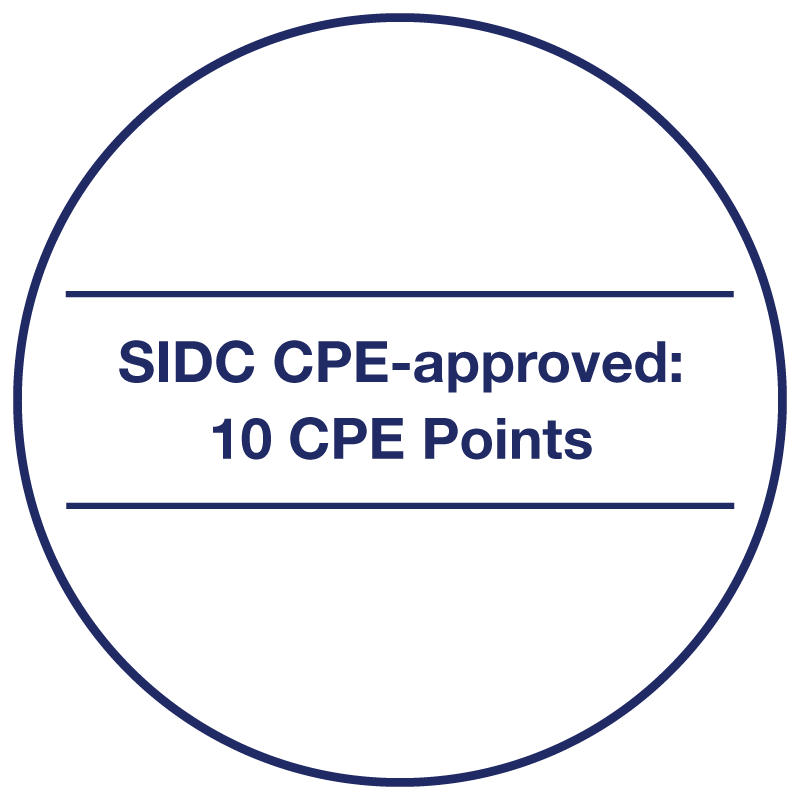Fee per participant: RM5,000/US$1,650
Discounts are available for group bookings. Please contact us for more details.

Enterprise Risk Management for Financial Institutions
SIDC CPE-approved: 10 CPE PointsDate: 10th & 11th June 2024
Venue: DoubleTree by Hilton Kuala Lumpur
Classroom Training
Effective risk management is a value-adding activity which impacts the achievement of organisational strategy and objectives, the stability of earnings and bottom-line performance. Risk also affects an organisation’s credit rating, share price and reputation. Therefore, enterprise risk management must be a key consideration for any business. In recent years, the business landscape has changed dramatically, largely due to fallouts from COVID-19 and the Russia/Ukraine conflict. Organisations globally have suffered severe effects from lockdowns, supply chain disruptions, systems and operational disruptions, energy crises, cyberattacks, market volatility, inflation and the ongoing economic instability. Many organisations have suffered significant losses from events such as fraud, misconduct, AML and sanction breaches, malware, ransomware, data leakages and extreme weather events, to name a few. Additionally, technology advances such as digitalisation, artificial intelligence, machine learning, robotics have also dramatically altered the risk landscape.
There is an urgent need for organisations to improve their approach to managing risk on an enterprise-wide basis to meet the demands of the dynamic and fast evolving business environment.
Fee per participant: RM5,000/US$1,650
Discounts are available for group bookings. Please contact us for more details.
If you are looking for an in-house training program or wish to send a group to an existing public program, kindly please contact Andrew Tebbutt at [email protected] or +603 2162 7802.
Learn More

Send me Details
For enquiries please contact:
Normariya Sariman
Account Manager, REDmoney Seminars
[email protected]
Direct Line: +603 2162 7800 ext 44
Ramesh Kalimuthu
Events Sales Director
[email protected]
Direct Line: +603 2162 7800 ext 65
Fax: +603 2162 7810
For sponsorship & speaking opportunities:
Andrew Tebbutt
Managing Director
[email protected]
Direct Line: +603 2162 7802
For marketing and media enquiries
Govina Selvanthran
Marketing Manager
[email protected]
Direct Line: +603 2162 7800 ext 22

Enterprise Risk Management for Financial Institutions
SIDC CPE-approved: 10 CPE PointsDate: 10th & 11th June 2024
Venue: DoubleTree by Hilton Kuala Lumpur
Classroom Training
Send me Details
Effective risk management is a value-adding activity which impacts the achievement of organisational strategy and objectives, the stability of earnings and bottom-line performance. Risk also affects an organisation’s credit rating, share price and reputation. Therefore, enterprise risk management must be a key consideration for any business. In recent years, the business landscape has changed dramatically, largely due to fallouts from COVID-19 and the Russia/Ukraine conflict. Organisations globally have suffered severe effects from lockdowns, supply chain disruptions, systems and operational disruptions, energy crises, cyberattacks, market volatility, inflation and the ongoing economic instability. Many organisations have suffered significant losses from events such as fraud, misconduct, AML and sanction breaches, malware, ransomware, data leakages and extreme weather events, to name a few. Additionally, technology advances such as digitalisation, artificial intelligence, machine learning, robotics have also dramatically altered the risk landscape.
There is an urgent need for organisations to improve their approach to managing risk on an enterprise-wide basis to meet the demands of the dynamic and fast evolving business environment.
Fee per participant: RM5,000/US$1,650
Discounts are available for group bookings. Please contact us for more details.
If you are looking for an in-house training program or wish to send a group to an existing public program, kindly please contact Andrew Tebbutt at [email protected] or +603 2162 7802.
Learn More


Dr Guan Seng Khoo
Former Group Chief Risk Officer, RHB Capital
Dr Guan Seng Khoo has vast experience of global business development, strategy, banking, investment and academic research experience in the financial services and IT/cyber security industries. Guan Seng held the role of VP/head of enterprise risk management at AIMCo (Alberta Investment Management Corporation) and CAI.
While at AIMCo, he was responsible for the entire risk management function across the whole lifecycle of the investment process, including at the due diligence/pre-investment stage, the deal-by-deal level as well as the portfolio and divestment/exit stages, including managing relationships with partners, clients, and key stakeholders. He has led teams for assignments and projects in the middle east, Europe, Asia-Pacific, north and south America. Prior to AIMCo, Guan Seng was the head/senior director of portfolio and performance risk analytics at Temasek Holdings. Previous to this, Guan Seng headed the global risk analytics team at Standard Chartered Bank, performing all global risk model review and validation for Basel & BIPRU compliance, and liaising with financial regulators in Europe, Asia, Africa, and the middle east, including the FSA (UK), the FSS (Korea), CBRC, HKMA, BNM, Bank of Thailand and Monetary Authority of Singapore. Guan Seng pioneered the use of AI in investment management, when he designed and managed an AI-algorithmic hedge fund while at Man Investment Products. Previously, Guan Seng was head of innovation (strategy & business development) at the Singapore Exchange, and was group chief risk officer at RHB Capital, Malaysia. In 2001-02, he was based in Chicago and Denver at American Bourses Corp (spun off from the Man Group), providing investment and trading analytics to clients trading on the ECNs (electronic exchanges) in North America and the Asia-Pacific. Guan Seng started his career with NTU as an academic, performing research in semiconductor physics and materials sciences, publishing scientific papers, and teaching undergraduates, including on environmental science. He graduated with a bachelor’s degree in science and holds MSc and PhD degrees from the National University of Singapore on a PSC Government Scholarship. He was awarded the Jurong Shipyard Book for Best Student in Applied Physics.


For enquiries please contact:
Normariya Sariman
Account Manager, REDmoney Seminars
[email protected]
Direct Line: +603 2162 7800 ext 44
Ramesh Kalimuthu
Events Sales Director
[email protected]
Direct Line: +603 2162 7800 ext 65
Fax: +603 2162 7810
For sponsorship & speaking opportunities:
Andrew Tebbutt
Managing Director
[email protected]
Direct Line: +603 2162 7802
For marketing and media enquiries
Govina Selvanthran
Marketing Manager
[email protected]
Direct Line: +603 2162 7800 ext 22
